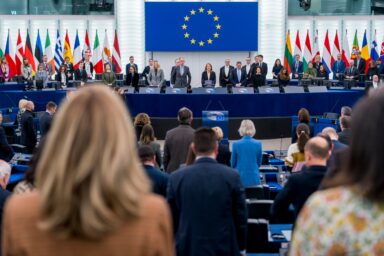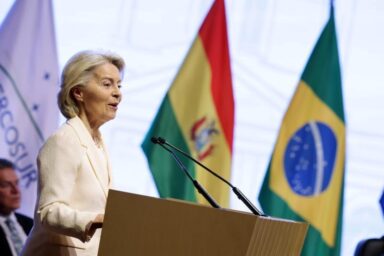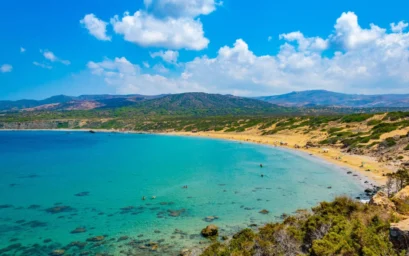The Commission’s White Paper on the future of European defence got a preliminary pass from the European Parliament by a comfortable 2:1 margin on 12 March. But the preceding debate on the parliamentary resolution on the document revealed sharp divides among the MEPs‘ views of the bloc’s defence along numerous political, geographical, strategic, and personal fault lines.
Had last Tuesday’s parliamentary debate on defence in Strasbourg been a football game, it would have had it all. The rare feeling of historical relevance inspired some MEPs to rise to the occasion with elevated rhetorical efforts, while heated exchanges among others included sharp ad hominem tackles. Clocking in at 149 minutes, it went well into overtime. Blue cards abounded, indicating a lively course of the debate.
The result materialised a day later in a floor vote on the resolution on the White Paper on the future of European defence scheduled for introduction by the European Commission next week. The document breezed through comfortably – but the mission itself is still in relegation zone, the debate showed.
Adam Szłapka, Poland’s European Affairs Minister and Andrius Kubilius, Commissioner for Defence and Space set the grave tone of the session. “We need to take greater responsibility for our own security and defence,“ Mr Szłapka said before summarising the principal points of the White Paper. “We must also preserve our transatlantic bonds. The step undertaken recently by the US administration may worry us, but this is our existential interest, and we should keep it above the current political developments,“ he stressed what would become one of the debate’s main fault lines: Should Europe go it alone, or seek the support of the suddenly unpredictable United States?
You might be interested
Less than five years
Mr Kubilius, whose native Lithuania celebrated its independence from Moscow on Tuesday, was more forceful. “In my view, those are the most important debates in the history of this House, because the days we are living through are days which will define the history of Europe,“ he described what he termed a wake-up call. “Russia’s war industry is operating at full blast. Russia could be ready for a confrontation with NATO in five years or less.“
The Commissioner went on to mention the need to support Ukraine, the US policy pivot to Asia notwithstanding. To that end, he proposed a complete overhaul of the European defence industry through the ReArmEU plan, an initiative separate from the White Paper. “If history is running, we cannot be walking,“ Mr Kubilius said.
Then he revealed another fault line. “Member states need to invest massively (…) and the EU will support member states with European Union added value, European scale, European coordination, European money and European laws.“ This proved controversial: while some MEPs spoke in favour of a less centralised approach to European defence, many called for the opposite.
The Commissioner also repeated his earlier exhortations for the Parliament to agree the negotiating position on EDIP, a programme that would allow joint military procurement. “It was proposed a year ago. History will not wait for us. Putin will not wait for us. All of Europe is a target of Russian aggression. We are all frontline member states.“
Having been presented with such an emotional force, the idea per se of bolstering European defence appeared to find significant support among the MEPs. Agreement about the nuts and bolts, however, was nowhere to be seen.
Russkiy Mir destroys and enslaves
Rasa Juknevičienė MEP (EPP/LI), a fellow Lithuanian, was on board, and was not one to mince words. “We must be prepared for war with Russia in the shortest possible time. Russia‘s ideology, Russkiy Mir, means destroying or enslaving everything that is not Russian.“
Ms Juknevičienė advocated for member states to commit at least 0.25 per cent of their GDP to military aid to Ukraine, for the integration of Ukraine’s defence industries with the Union’s, and for increasing the member states‘ defence spending to at least three per cent of GDP. “Defence is the priority of priorities. The EU was not created as a defence union. (But) everything has changed,“ she said on behalf of the EPP, the Parliament’s strongest faction. It would soon transpire that her views were widely shared among her party colleagues.
The Socialists were slightly less supportive. Giannis Maniatis MEP, speaking on behalf of the S&D faction, took issue with European governments buying mostly American weapons. “It is not sustainable for more than 70 per cent of the money we spend on armaments to go to third countries,“ the Greek MEP said. “Third countries“ became a byword for the United States, a long-time staunch ally which, after the arrival of the current Trump administration, has become unpredictable at best.
The sentiment was shared, somewhat counterintuitively, by factions who normally do not see eye to eye on many matters. Pierre-Romain Thionnet MEP, speaking on behalf of the Patriots for Europe faction, pointed out the perceived Achilles heel of the White Paper: “Are the calls for European strategic autonomy really sincere? Imagine the scenario: after Donald Trump has made the continuation of US protection conditional on increased defence budgets, tomorrow he will announce another condition: the rearmament of Europe must come from the US military industry. This will be a moment of truth for Europe.“
Make war not love
The Renew group made the same point, even if in slightly more nuanced terms. Nathalie Loiseau MEP conveyed the faction’s reservations to the MEPs: “Our industry exports mainly outside the European Union and most of our member states buy essentially outside Europe. We can no longer afford this, and we must unconditionally adopt strong European preferences – at last! (…) So let us welcome last Thursday’s Council meeting, but let us be clear: it is only a first step.“
The Greens, having long abandoned their peacenik mantle of yore, pushed for more European unified approach to a rearmament. Reinier Van Lanschot MEP made that clear on behalf of the Greens/EFA group: “Too many of you still believe that twenty-seven Member States should simply do more, instead of doing things together. Too many of you still believe we can sit back and rely on NATO. (…) How can we be strong enough to defend Europe? The answer to that existential question is simple and consists of three things: Unite! Unite! Unite!“ he stressed.
The Conservatives were evenly split on the White Paper, apparently along geographical lines. Some of them voiced their support, such as Latvia’s Rihards Kols MEP: “In addition to the 150 billion in loans, grant mechanisms must be introduced to give an incentive for transnational joint procurement,“ the member said in a somewhat unusual call from the ECR faction for more European unity. “We must take advantage of the benefits of Ukraine’s defence industry – its advanced military technologies have already proven themselves on the battlefield. By buying arms from Ukraine, we are not only helping its economy, but also investing in our own security.“
In contempt of geography
Some of his fellow Conservatives disagreed, and some chose to tackle the issue from unconventional angles. The Italian member Elena Donazzan had this to say: “Above all, we need to talk to young people so that they have more love of country and the ability to defend themselves,“ she urged for a more love-based defence system.
The fringe groups did their status justice on Tuesday. “Eight-hundred billion is not enough to raise Europeans’ salaries, nor to raise pensions, nor to provide quality healthcare for all Europeans without waiting lists, nor even to make sure that buses and trains run on time in every town and village. No, you have fallen in love with war madness. Congratulations!“ Marc Botenga MEP presented a vintage display on behalf of the Left.
“Russia, fortunately, cannot even conquer a quarter of Ukraine. It will be a long time before the Russians descend on the Brussels Grand-Place!“ the Belgian member continued, disregarding the fact of geography that most places in Europe are much closer to Russia than Brussels.
The ESN faction, for its part, chose the German MEP Petr Bystron to voice dissatisfaction with the White Paper in a rather oblique fashion: “As we speak, hundreds of thousands of people are demonstrating in Romania against this EU and in favour of its candidate. As we speak, hundreds of thousands of people are demonstrating in Romania against this EU and in favour of its candidate. In favour of a popular candidate who had his election stolen because he was against the war, against more arms supplies to Ukraine.“
Welcome, disgruntled Americans
Most of the debaters appeared genuinely concerned. Some attempted a Churchillian tone to find out that even the most dramatic turns of speech got tired by frequent repetition. Others brought up serious issues.
David McAllister MEP (EPP/DE), Chair of the Foreign affairs Committee, made a convincing case for bolder – and more specific – joint action. “(Previous initiatives) are slowly but surely pushing member states to step outside their national corridors in pursuit of a genuine European Defence Union. But now we really have to make a great leap,“ he said. “The White Paper must propose regulatory and programmatic initiatives at European level.“
Hannah Neumann MEP (Greens-EFA/DE) proposed to open the door for American experts disenchanted with the Trump administration. “ Let’s roll out the red carpet, launch a new blue card for a new era, a fast-track visa for skilled professionals from the US who want to work in Europe and build a future based on ethics, sustainability and fair growth. And to the scientists, engineers and innovators in the US: come to Europe,“ she said.
Ville Niinistö MEP (Greens-EFA/FIN) sounded a similar note. “Mr President, coming from a country that shares 1300 kilometres of border with Russia and a country that has had over 50 wars with Russia in its history, I must say to you that we must show (…) must show that Europe can act alone without the support of the United States.“
Adam Bielan (ECR/PL), on the other hand, spoke strongly in favour of sticking to NATO and the US. “If Europe needs to step up, any European-led initiatives must complement, not duplicate, NATO’s role. In its current form, the joint resolution is concerning. Instead of strengthening Europe’s security, it promotes an alternative to NATO, undermines the autonomy of Member States in defence matters and risks deepening confrontation with the United States – our most important ally.“
The Finnish highlight
Bart Groothuis MEP (Renew/NL) pointed out that when it comes to a solid security architecture, “it should also include the UK, Norway, Turkey, Iceland, even Canada in a European security council – of which nothing has been mentioned“.
Virginijus Sinkevičius MEP (Greens-EFA/LI) floated the idea of a more unified defence union. “We also should move beyond intergovernmental agreements and build a genuine European Defence Union.“ Elio Di Rupo MEP (S&D/BE) elaborated on the topic: “Do you really think it is possible to build a Europe of defence with twenty-seven countries? Given the urgency, should we not encourage a small group of member states to move forward on this issue, as we did for Schengen?“
Alice Teodorescu Måwe MEP (EPP/SWE) pointed out that the US and Russia together held more than 90 per cent of the world’s nuclear arsenal. “In Europe, France and the UK have nuclear weapons equivalent to 515 warheads between them (…) we need to acquire our own credible deterrence capability, which in plain language means a larger nuclear arsenal,“ the Swedish lawyer made a bold call.
The oratorical highlight of the day was provided by Pekka Toveri MEP (EPP/FIN). “Those who say that Russia is not a threat normally come from countries that has not been attacked, occupied, raped and pillaged dozens of times through history like Finland, Estonia, Latvia, Lithuania, Poland and many other countries have. I have three children, all in the Finnish army reserves, ready to defend us all. I want them to be properly equipped to do that,“ the MEP said.
Mr Toveri received some support from an ideological opponent (but fellow Finn), Merja Kyllönen MEP (The Left/FIN). When Fernand Kartheiser (ECR/LUX) said the EU should “learn to listen to our neighbours, and re-learn the art of diplomacy“, Ms Kyllönen shot back: “Diplomacy really did not help Finland when our neighbour Russia decided to come across the border.“
From Orwell to Nazis
The session also saw its fair share of the unorthodox and the downright bizarre. Roberto Vannacci MEP (PfE/IT) called the White Paper a Trojan horse on grounds that remained unkown. Sarah Knafo MEP (ESN/FR) gloated that “you are discovering independence through anti-Trumpism. General de Gaulle has been telling you that for seventy years“. Ruth Firmenich MEP (NI/DE) drew her inspiration from history. “Peace is considered treason by you – this is reminiscent of George Orwell. You say defence and mean attack, preparing a war against Russia. The EU’s unrestrained hubris reminds us of the German Empire,“ she said, without specifying who “we“ meant.
Giorgos Georgiou MEP (The Left/GR) had a lot of things to say of varying degree of relevance, but he also raised a serious point that “for there to be a common defence, there must also be a common foreign policy“. His compatriot Vangelis Meimarakis MEP (EPP) praised his own foresight: “The Greek government of the New Democracy, in which I was Minister of Defence, has been calling for the creation of a Defence Commissioner, the adoption of the escape clause in defence spending and a deterrence and protection force.“ Most other Greek speakers focused on driving the point home that Turkey was bad.
The session also heard that the Green Deal should be abolished immediately; a suggestion to ask whether it is a priority to return to the negotiating table (with Russia and the US, to which it has never been invited); and was served a poignant reminder by Özlem Demirel MEP (The Left/DE) that the White Paper on defence dealt with weaponry. “You have to realize that you are growing an arms industry, (…), and that is unacceptable. Arms will not make Europe or the world safer. Militarism weakens liberal democracy.“
Mr Szłapka blew the final whistle just short of the two-and-half hour mark. The Commission is to present the White Paper next week in Brussels.











